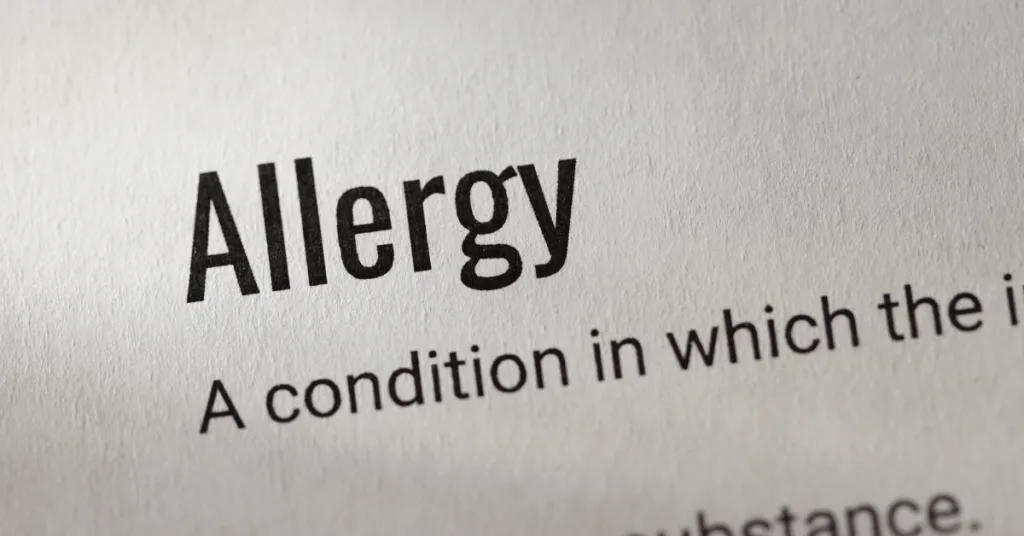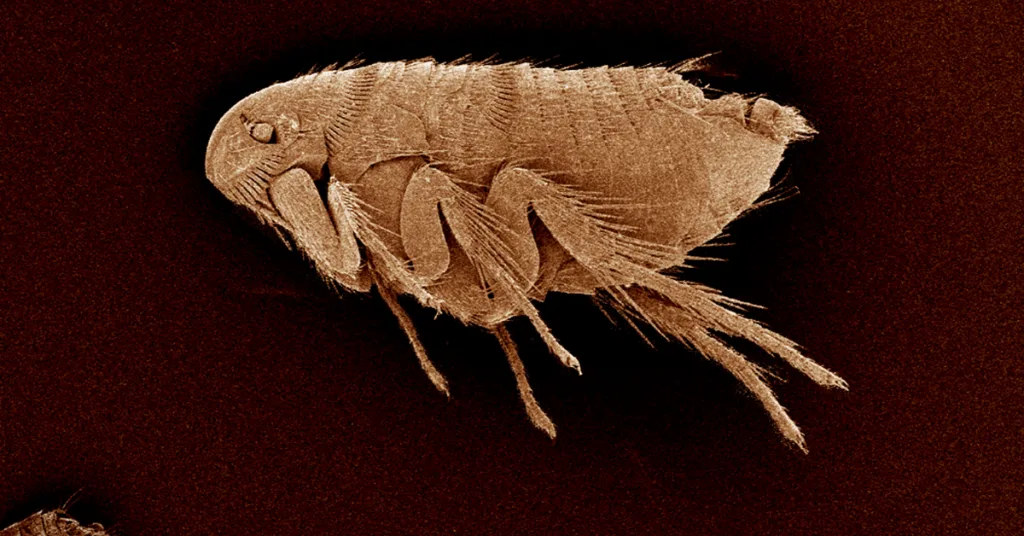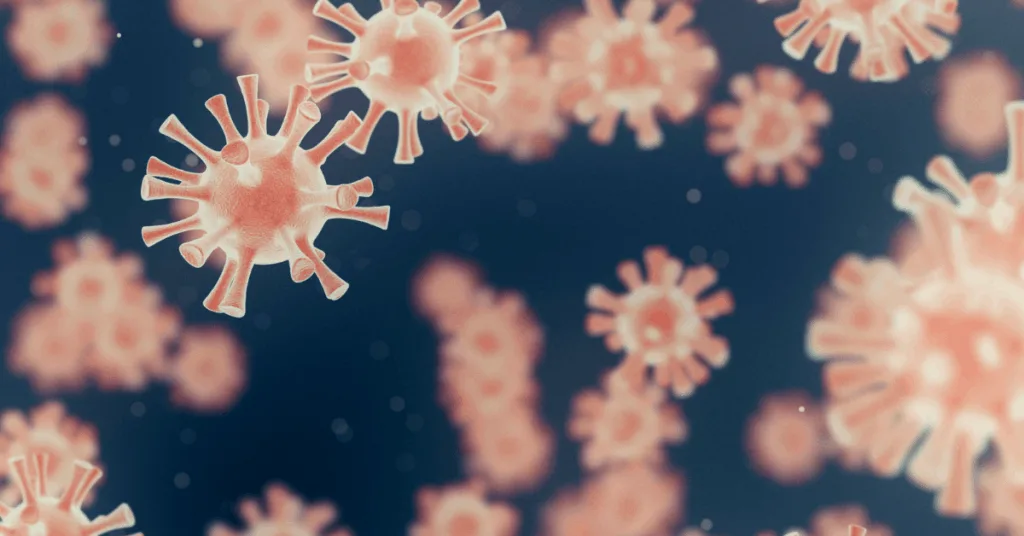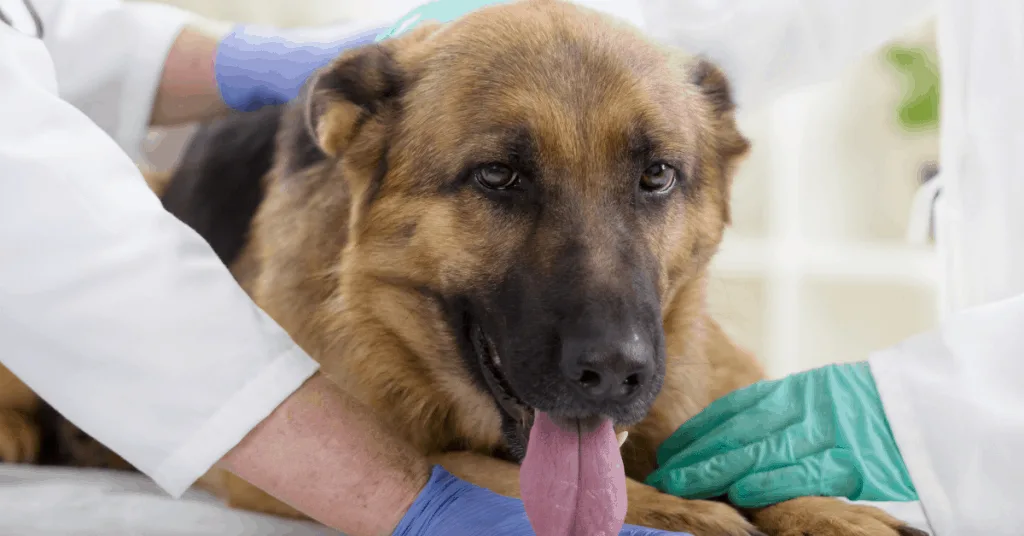
Humans are not the only ones that suffer through allergies and their irritating symptoms.
Our German Shepherds are at risk to common allergens as well, and can struggle immensely when they are left untreated.
Since not all allergies look the same in every German Shepherd, it’s important to understand the many ways in which allergies can affect your furry friend.
In this article we’ll tell you everything you need to know about German Shepherd allergies, and help you bring relief to your canine companion going forward!
Click Here to Jump to a Section
So What Is An Allergy In German Shepherds?
Before we dive into the details of allergies in German Shepherds, we should first discuss the basics of dog allergies in general.
An allergy is the body’s abnormal response to a substance that is usually harmless, and results in an overreaction of the immune system.
Though our German Shepherds’ immune systems are made to protect them against illness, their immune system can actually be harmful when it comes to allergies.
These allergies can be a sudden reaction to a new substance in their environment, or a chronic issue with something that they are exposed to each day.
Anytime our German Shepherds are exposed to an allergen, a few things will happen within their body.
When dogs are first exposed to a potential allergen (something they are allergic to), their body will ignite an allergic response.
Their immune system will kick into gear as if it is ready to attack a foreign invader, and will attempt to destroy this “harmful agent” through the body’s allergic response.
The body will release a team of antibodies in effort to attack the invader, which will come in contact with some of the many mast cells that live within your Shepherd’s body.
Once these mast cells have been invaded by the antibodies, the mast cells will release histamine and other potent chemicals that will travel throughout the body.
Histamine and other allergic reaction chemicals are what cause the redness, swelling, itching, and other concerning symptoms of an allergic reaction.
Allergic reactions in German Shepherds will vary based on how potent the allergen is to your canine companion.
This is why some dogs will experience prolonged itching and discomfort from allergies, while others will have a more serious and sudden allergic reaction.
Symptoms Of Allergies In German Shepherds

Now that you understand the basics of an allergic response, let’s discuss the many symptoms of allergies in our German Shepherd companions.
Some of the most common symptoms of allergies that you may see in your GermanShepherd include:
- Redness of the skin
- Frequent itching and scratching
- Chewing or licking at the skin
- Hair loss
- Chronic ear infections
- Scratching at the ears or shaking their head
- Flaky or dry skin
- Chronic skin infections
- Hot spots (areas of inflamed and infected skin)
- Discharge from the eyes
- Sneezing or runny nose
- Hives
- Swelling of the ears, eyes, muzzle, etc.
- Diarrhea
- Gas
- Vomiting
- Change in appetite
For more great information about allergy symptoms, we have an excellent article for you right here:
Itchy German Shepherd? Why and What to Do
Sudden Allergic Reactions & Anaphylactic Reactions
Like we mentioned above, allergies in our German Shepherds can vary.
While the list of symptoms above is most common in German Shepherds with chronic allergies, there are symptoms to be aware of in more serious allergic reactions as well.
Not to say that chronic allergies should not be taken seriously as well, but acute allergic reactions are definitely more serious of a situation that requires immediate veterinary attention.
Some signs of an acute allergic reaction include:
- Swelling of the face (ears, muzzle, around the eyes, etc)
- Hives
- Redness of the skin
- Itching that seems unbearable
- Pawing at the face
German Shepherds can experience serious allergic reactions with any substance, but it’s most common in reaction to getting their yearly vaccines, being stung by insects, or any other new addition to their environment or body.
On top of acute allergic reactions is the possibility of experiencing an anaphylactic reaction.
An anaphylactic reaction is an immediate response to an allergen that can result in life threatening symptoms. Symptoms of anaphylaxis in German Shepherds include the symptoms above, in addition to:
- Vomiting
- Diarrhea
- Weakness
- Drooling
- Difficulty breathing
- Collapse
- Pale gums
Serious allergic reactions or anaphylaxis in German Shepherds are serious medical emergencies, so it’s important to contact your veterinarian immediately if you see any of the above symptoms in your canine companion.
Are German Shepherds Prone To Allergies?
Though our German Shepherds are impressive pups with many capabilities, they are quite prone to allergies that can impact their daily lives.
German Shepherds are one of the most impacted breeds when it comes to skin allergies, making it so very important to understand how allergies can impact our Shepherds.
Since German Shepherds are so prone to allergies and conditions that affect their skin, it is likely something you will encounter at some point throughout your Shepherd’s life.
Another factor to keep in mind is the fact that allergies in German Shepherds may be hereditary, and can result in their offspring being more prone to allergies.
Though the allergies themselves cannot transfer from dog to dog, many believe that breeding a dog with sensitives can result in their offspring inheriting the sensitivities as well.
Due to this, it’s best to not breed a German Shepherd with chronic allergies.
It is also, therefore, very important that you discuss with your breeder the allergic histories of your GSD’s parents.
An ethical and reputable breeder will not hesitate to disclose any such information, and you and your Shepherd will be better prepared for what may arise in the future.
Now that we’ve discussed the basics of allergies and what symptoms to be aware of, let’s discuss the types of allergies that our German Shepherds can potentially experience.
What Type Of Allergies Can German Shepherds Have?

Our German Shepherd friends can experience multiple forms of allergies that can cause them great discomfort.
Let’s briefly introduce you to the forms of allergies that they can experience, and then dive into each in detail below.
German Shepherd’s can experience:
Environmental Allergies: An environmental allergy is a reaction to some kind of substance in the world around your dog.
This can be pollen, grass, plants, dander, dust, and any other substance that is found in your dog’s surroundings.
Food Allergies: A food allergy is a reaction to something your dog eats.
This can include their daily diet (kibble or canned food), treats, certain proteins, certain grains, and any other substance your dog consumes.
Inhalant Allergies: An inhalant allergy is any type of allergen that your dog can breathe in.
This can again be types of pollen or dander that are in the air, dust, dander, perfumes, molds, mildew, and more.
Contact Allergies: A contact allergy is an allergy to a substance that has come in contact with your dog’s skin.
This can include flea treatments, shampoos, grass, types of carpet, or any other substance or material that has come in direct contact with your German Shepherd.
What Are The Most Common Allergens In German Shepherds?
Though your German Shepherd can be allergic to anything in the world around them, there are some common allergens that are known to cause issues for our beloved German Shepherds.
Some of the most common allergens to be aware of in German Shepherds include:
- Fleas
- Pollen
- Dust
- Mildew
- Beef
- Chicken
- Corn
- Soy
- Wheat
Though these are common allergens for German Shepherds, it does not mean that your Shepherd will automatically have a reaction to these items.
Just be sure to monitor for any signs of allergies if you know your Shepherd is exposed to any of these substances or items.
Flea Allergies In German Shepherds

Flea allergies are the most common allergies in German Shepherds, and in dogs in general.
Flea allergy dermatitis is one of the most diagnosed skin conditions in German Shepherds, and is the main culprit behind canine itching.
Though it is extremely common in dogs of all kinds, it can stump dog owners when they have not seen fleas on their furry friend.
If your German Shepherd doesn’t have any fleas, how can they have a current flea allergy?
Flea allergies are such a large issue in dogs due to the flea only needing to bite your German Shepherd once in order to cause serious itching.
That’s right, your Shepherd does not need to have a flea infestation to experience symptoms of a flea allergy.
When a flea jumps on your German Shepherd to feed, their bite injects a small amount of saliva. The saliva is what causes a flea allergy in your dog, and not the presence of the fleas living in your dog’s fur.
Since many flea repellents work by killing fleas once they come in contact with your dog’s skin, this means the damage may already be done if they were able to bite your Shepherd.
Signs Of Flea Allergies In Your German Shepherd
Flea allergies in our furry friends tend to have a few common symptoms.
Though every Shepherd is different, the most common flea allergy symptoms in German Shepherds include:
- Constant itching and biting at the skin
- Hair loss, usually around their back end
- Seeming frustrated and suddenly biting at a certain area
- Skin irritation and redness
- Localized irritation in one spot
- Hot spots
Treating Flea Allergies In Your German Shepherd
So how do you treat flea allergies in your German Shepherd?
The most important part of treatment is flea control.
Even if your German Shepherd does not have an active flea infestation, it is still extremely important to keep up with their monthly prescribed flea prevention and treatment of your environment.
Since just one flea can cause an allergy, it’s best to prevent the presence of fleas as best as possible.
Even if your dog is on flea prevention, you should try your best to comb through their fur and check for any live fleas. You can do this by using a flea brush like the Weback Flea Comb.
Actual treatment of your German Shepherd’s flea allergy will vary based on the severity of your dog’s skin.
Some vets will prescribe steroids for the inflammation, they may prescribe antibiotics for any secondary skin infections, or may just recommend at home care if there are no open wounds or current infections on the skin.
Some of the most common at home treatments for minor allergies to soothe a dog’s irritated skin include soothing shampoos such as Pro Pet Works Oatmeal Shampoo or Earthbath Oatmeal & Aloe Shampoo.
Environmental & Inhalant Allergies In German Shepherds
The second most common cause of allergies in German Shepherds are environmental allergies.
Similar to humans experiencing seasonal allergies to pollen or other plant material, our German Shepherds can suffer the same as well.
Since there are so many different substances and material in the world around our German Shepherds, these types of allergies can be a bit more challenging to diagnose.
Your vet will often diagnose environmental allergies through a process of elimination.
Signs Of Environmental & Inhalant Allergies In Your German Shepherd
Environmental and inhalant allergies in our furry friends can cause a list of common symptoms.
Though every German Shepherd is different, the most common environmental and inhalant allergy symptoms in Shepherds include:
- Skin irritation and redness
- Itchy skin
- Chronic ear infections
- Scratching at the ears or shaking their head
- Flaky or dry skin
- Chronic skin infections
- Discharge from the eyes
- Sneezing or runny nose
Treating Environmental & Inhalant Allergies In Your German Shepherd
Since it can be a bit tricky to find the exact cause of your German Shepherd’s environmental or inhalant allergy, your vet will often approach it from all angles.
If your vet has ruled out the presence of a flea allergy, they will likely try a few different approaches to cure your GSD’s discomfort.
These options generally include:
- The use of daily benadryl during times of the year that your dog experiences symptoms
- Offering a prescription strength antihistamine for daily use
- Offering a daily medication called Apoquel that help to relieve the symptoms of allergies in dogs
- A monthly injection called cytopoint that helps to relieve the symptoms of allergies in dogs
- Recommending a weekly bath with a shampoo that helps to soothe the skin and relieve itchiness (Pro Pet Works Oatmeal Shampoo or Earthbath Oatmeal & Aloe Shampoo are trusted shampoos that we recommend)
Food Allergies In German Shepherds

Though food allergies are one of the most rare forms of allergies in German Shepherds, they can never be ruled out completely.
Some German Shepherds are known to have a sensitive stomach, and some may experience actual allergies to certain types of food.
Since German Shepherds are one of the breeds most likely to suffer from allergies, this increases their chance of having food allergies as well.
Some of the most common food allergens that affect German Shepherds are chicken, beef, corn, soy, and wheat, and even preservatives used in some food.
Food allergies can be tough to navigate since there are so many ingredients in commercial dog food.
Though we often hear of grains being the “bad guy” when it comes to food allergies, dogs are actually most commonly allergic to proteins rather than grains.
Luckily for the sensitive German Shepherds of the world, almost every pet food brand has a limited ingredient option, a limited protein option, or even a sensitive stomach recipe.
Signs Of Food Allergy In Your German Shepherd
If you are able to rule out flea allergies and environmental allergies, it’s very possible that your German Shepherd is allergic to something they are exposed to in their daily diet.
Some of the most common symptoms of food allergies in dogs includes:
- Red or irritated skin
- Frequent itching and scratching
- Chewing or licking at the skin
- Chronic ear infections
- Chronic skin infections
- Diarrhea
- Gas
- Vomiting
- Change in appetite
Treating Food Allergies In Your German Shepherd
When it comes to allergies, food allergies are much more tricky to treat.
Since the only way to cure your German Shepherd’s distress is by finding the source of the allergy in their food, the process of treatment can be lengthy.
Though there are a few ways to eliminate the allergy in their diet, let’s first discuss a food trial.
The first method of getting to the bottom of your German Shepherd’s food allergy is by doing a food trial or elimination diet.
This simply means testing new sources of proteins and carbs until you find an option that suits your Shepherd companion.
Though it sounds simple, the process can take some time. A food trial should be practiced for a minimum of 12 weeks to get an accurate answer, meaning it could take months to figure out which protein and carbohydrate combination is safe for your beloved GSD.
Thankfully, there are many pet food brands that offer limited protein diets, and diets that only offer one individual protein at a time.
For example, Wellness Limited Ingredient Kibble offers a salmon and potato diet that is free of common allergens such as chicken, dairy, eggs, and more.
Another option for a food trial is by creating an at home diet that allows you to be aware of every single ingredient that goes into your German Shepherd’s food.
Though this is possible, it’s important to be sure to have every single recipe approved by your vet before offering it to your dog.
It’s easy to unintentionally leave out necessary nutrients when switching to a homemade diet, so it’s important that you check with your vet and make sure that you are not missing any essential nutrients.
Another food option is a hydrolyzed protein diet that your veterinarian can prescribe.
A hydrolyzed protein diet offers protein that has been broken down to the point of being easily tolerated by the immune system, resulting in less of an allergic response when eating the protein daily.
Though some diets on the shelves claim to offer hydrolyzed protein, it’s important to only offer a prescribed version that your vet recommends.
Contact Allergies in German Shepherds

Contact allergies are the most uncommon form of allergies in German Shepherds, but they can certainly cause them great discomfort.
Since this allergy involves your dog coming in direct contact with a substance that her body does not approve of, this can result in localized pain and severe itchiness.
Though it’s irritating enough for our furry friends to deal with a contact allergy, many times our German Shepherds will continue to be exposed until we become aware of the problem.
Because of this, some contact allergies in German Shepherds can be severe.
The most common forms of contact allergies include topical flea and tick prevention, flea and tick collars, shampoos, fragrances, certain types of fabric, collars, our lotion, plants, cleaning supplies, and more.
Virtually any substance can cause a contact allergy if your German Shepherd is sensitive to it.
Signs Of Contact Allergies In Your German Shepherd
Contact allergies in German Shepherds bring with them a host of uncomfortable symptoms.
Though each allergy will vary based on the allergen in question, the most common contact allergy symptoms in German Shepherds include:
- Localized skin irritation or redness
- Appearance of burns or severe irritation in one area
- Intense itching or irritation
- Biting or chewing at the skin
- Hot spot in the affected area
- Localized hair loss
Treating Contact Allergies In Your German Shepherd
The best way to treat a contact allergy in your German Shepherd is by removing the allergen itself.
Since a contact allergen will generally affect the area it touched on your German Shepherd, you can begin to narrow down the possibilities of what caused the irritation.
For example, if your German Shepherd has a red patch in the area that you applied their monthly flea prevention, you can begin to assume the allergy was caused by the topical treatment.
If your German Shepherd has skin irritation all over their belly and you know they love to lay on their belly in the grass each time they go outside, you may begin to assume that they are having a reaction to the grass.
If you are able to eliminate the allergen entirely, this is the best method.
However, if you are unable to remove the possible allergen completely, you should try your best to limit their exposure to it.
If you are unable to limit their exposure, you can speak with your vet about prescribed allergy medications that can bring them relief.
Keep in mind that you may need to have the irritated area treated by a veterinarian if it appears to be infected or is causing your dog great discomfort.
Contact allergies can lead to further complications, so be sure to keep a close eye on the area for your canine companion.
Complications Of Allergies In German Shepherds
Not only can allergies cause great discomfort to our German Shepherds, they can also result in medical complications that can impact their daily lives.
Some of the most common complications of allergies in German Shepherds include:
- Skin infections
- Ear infections
- Wounds from excessive scratching or biting
- Chronic upper respiratory symptoms
- Eye infections and ulcers from pawing at their eyes
- Fur loss
- Diarrhea
- Vomiting
Secondary infections are one of the most common complications of allergies in German Shepherds.
Skin, ear, and eye infections can become serious if left untreated, making it so important to take the symptoms of allergies seriously when they are first noticed.
If you fear that your German Shepherd is having secondary complications from their allergies, it’s best to contact your veterinarian.
Soothing Allergies In Your German Shepherd
So how can you make your German Shepherd’s life more comfortable when they suffer from allergies?
Some of the most effective ways to tame your GDS’s allergies and offer her comfort include:
- Giving your GSD a weekly bath with a soothing shampoo.
Try your best to look for shampoos with calming properties such as oatmeal, aloe, lavender, honey, and more. - Offer your German Shepherd a daily omega fatty acid supplement to help improve skin health.
This not only helps to hydrate the skin and promote healing, but it can also offer much needed joint support that your German Shepherd requires. - Keep up with your German Shepherd’s monthly flea and tick prevention.
- Discuss the daily use of benadryl when your German Shepherd is experiencing an allergy flare up.
- Brush your German Shepherd daily to limit the amount of allergens that can cling to their fur. This will also help to prevent a build up of fur and pet dander around your home.
- Offer them a quality diet to help prevent any additional sensitivities to artificial ingredients and preservatives that are often found in low quality food.
- Try your best to limit the chemicals used within your home.
- Be careful with any scents or essential oils that you diffuse within your home.
- Wash your dog’s bed and blankets frequently when they are experiencing allergy flare ups.
- Monitor your German Shepherd closely for any signs of skin infection, ear infection, or other complications from their allergies.
When To See A Vet For Your German Shepherd’s Allergies

So when should you seek veterinary advice for your German Shepherd’s allergies?
In order to give your Shepherd the best chance at comfort, we recommend consulting with your vet from the moment you notice symptoms.
A veterinarian will be able to intervene quickly and offer your GSD the relief she deserves, and help you come to a conclusion of what could be irritating your canine companion.
If you are unable to immediately see your vet at the first sign of an itch, just be sure to keep your vet in the loop from the moment things seem out of your control.
If your dog’s allergy symptoms seem to be causing your Shepherd great discomfort and you are unable to give them relief with at home remedies, it’s time to see your vet.
It’s also important to contact your vet immediately if you believe that your German Shepherd is experiencing signs of a serious allergic reaction or an anaphylactic reaction.
These conditions are beyond home care and require the attention of a professional.
Final Thoughts
Though allergies in our German Shepherd companions are common, it does not mean they have to suffer through their symptoms.
As a responsible dog owner, it is your responsibility to notice any abnormality in your GSD’s well-being, and to be proactive about resolving any issues.
Be sure to review the information that we have discussed above, and you will have a better understanding of how to help your GSD going forward.
Trust us – your German Shepherd will thank you!
